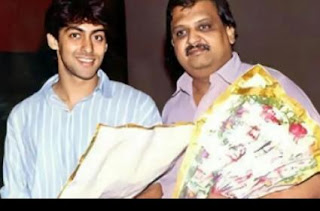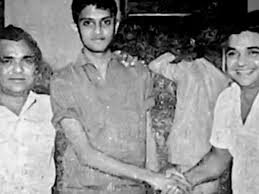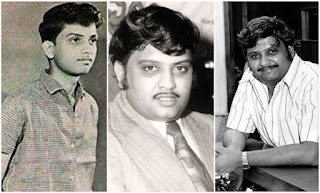PART 8 OF 10: THE VOICE OF SALMAN KHAN
Two hundred years from now, when our descendants read their history books, 1989 will come in for special mention as a year of seminal proportions. Here is why.
The world went through a Visu-caliber drama from the 1917 Bolshevik Revolution when Communism found a home in Soviet Union till Karl Marx's grand philosophy that had fanned across the world, collapsed like bicycles parked in a Chennai cinema cycle stand. That collapse happened in 1989. It was a "red-letter" year not just due to the death of a philosophy, for that kind of creative destruction of ideas happens all the time. It was the fact that the United States and Soviet Union were on a path of mutually-assured destruction and in the process were taking the whole world along with them. If it were not for Gorbachev's pet project, Perestroika, which caused the disintegration of the Soviet Union and a cluster of Eastern Bloc countries, and brought them western-style freedoms (such as McDonald's burgers and Lay's Chips), the world as we know it would have been annihilated. That is why 1989 calls for a toast.
Coming to more serious matters, the Hindi Film Industry had been on a tailspin for half a decade, both in terms of content and profits. The "one man industry", Amitabh Bachchan, had lost his plot and had been plopping back-to-back duds for years. Film producers were desperate to crack the formula for the vaccine that would inoculate their investments for the next decade. VCRs and pirated video cassettes were further adding to their woes keeping the already disinterested theater audiences away.
There was a glimmer of hope the year before, when a chocolate-faced debutant and an ex-Miss India delivered a massive musical hit: a neatly packaged, tragic love story called 'Qayamat Se Qayamat Tak' (QSQT). That didn't spark off a trend. Perhaps because it wasn't 1989 yet. Inspired by audience reaction to QSQT, Sooraj Barjatya, the scion of yesteryear production house, Rajshri, assembled a team of debutants to film what was essentially a Marwari love story. This movie set the trend for the Hindi movies that would be made for the next quarter century: films with zero plot tension; family "love stories" set in the milieu of marriage, music and frolic; rich upper caste men and women dancing and feeding each other sweets; wives worshipping their husbands with sieves; and relatives and servants playing cricket and accepting umpiring decisions from Tuffy the Pomeranian. Bollywood had found its freaking formula! The movie's name was 'Maine Pyar Kiya' (MPK), which blazed new trails and bucked umpteen trends. I won't name every trend that MPK bucked, but this movie signaled the end of that relic of Hindi cinema called the villain. For twenty-five years after this 1989 release, the villains in Hindi movies got weaker and weaker till they totally disappeared. Ranjit went into depression, Prem Chopra filed for bankruptcy, and Amrish Puri diversified and started feeding sparrows.
Sooraj Barjatya brought a friend of the Rajshri family, Vijay Patil aka Ram Laxman, who had scored music for several of their productions, as music director for MPK. Barjatya was apparently a big fan of Balu and had always desired to use him for his debut movie. Balu was till then, in spite of his national award for 'Ek Duje Ke Liye' and his preeminent position in the South, couldn't gain so-called national stature. With MPK, Barjatya (and Salman Khan) changed that for Balu. He came to be recognized as a mainstream Hindi playback singer. The songs of MPK set the Geetmalas on fire. Salman Khan became the hottest property in town. And Balu, his singing voice. There were lovely numbers that followed with Ram Laxman, Anand-Milind, LP, and Nadeem-Shravan, where Balu was to Salman what Mukesh was to Raj Kapoor.
The song I chose here is from the Salman Khan - Revathi starrer, 'Love' (1991). The movie credits disingenuously show the score for this song to be by Anand-Milind. They cheated. And I cheated too when I chose 'Saathiya tune kya kiya'. I had vowed, in a earlier chapter, that I would keep Ilaiyaraja away from further discussion and focus on Balu's work with other music directors. But I couldn't help myself. This tune is a faithful carbon copy of Ilaiyaraja's Telugu number from the movie, 'Prema' ('Love' was its remake). In fact, Anand-Milind, the sons of yesteryear music legend Chitragupt, blatantly plagiarized a bunch of Ilaiyaraja's tunes into Hindi, without ever giving him credit. I don't know why Ilaiyaraja never sued them for copyright violation. Instead, in 2018, he sued his fellow band mate and life-long collaborator, Balu, for singing his songs on stage without permission. They eventually kissed and made up but Balu was deeply disturbed by his friend of fifty years sending him a lawyer's notice. Strange are the ways of the world.
Listen to this beautiful duet from Balu and the South Indian koel, Chithra. The lyrics are by Majrooh Sultanpuri.







Comments
Post a Comment